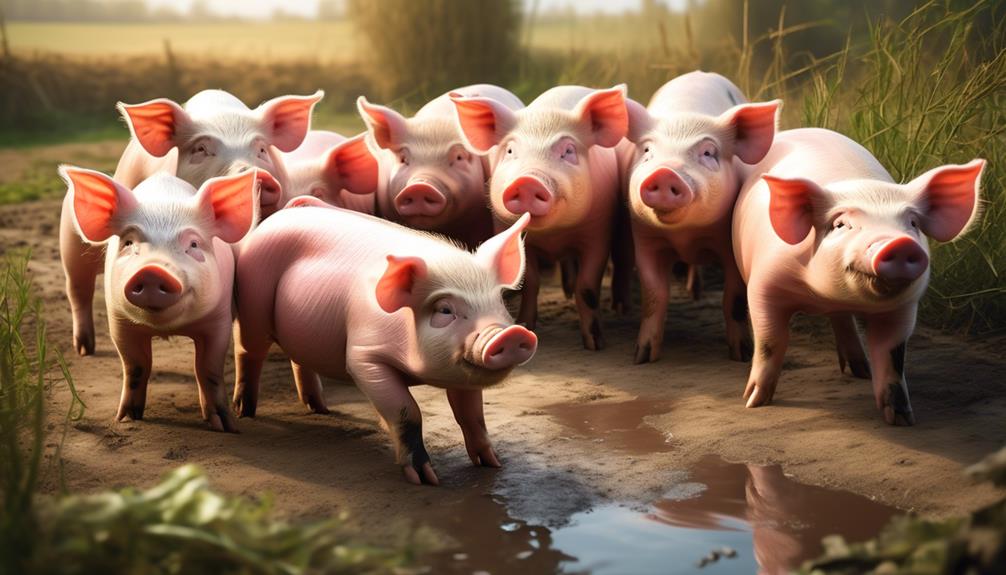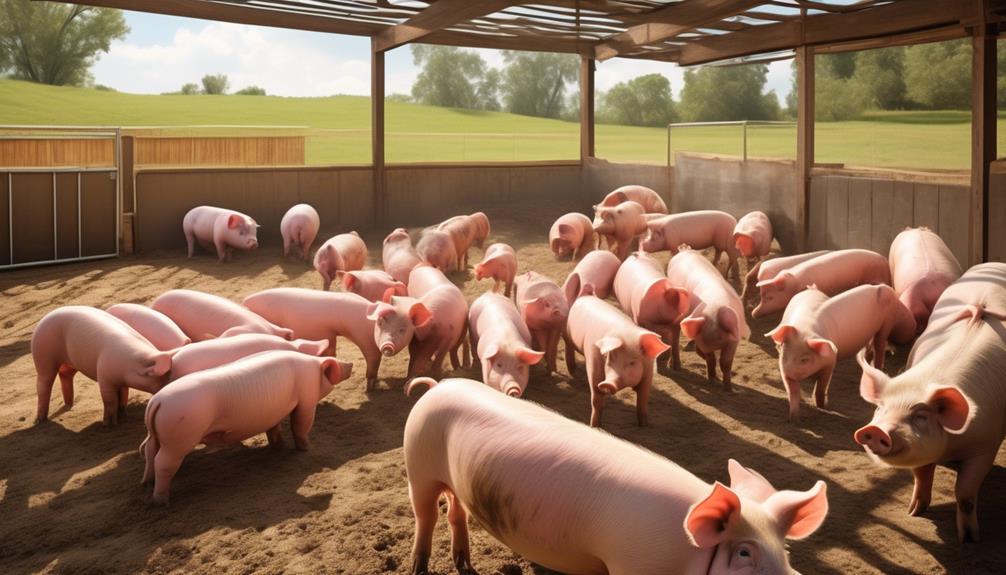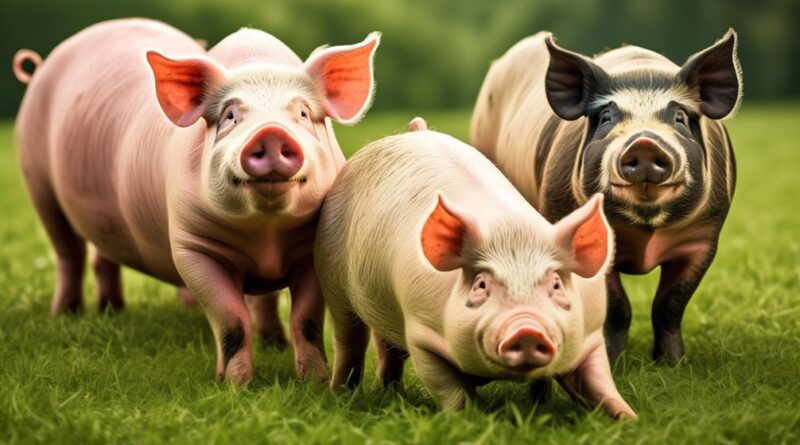Longest Living Pig Breeds: Detailed Insights
Do you know that the average lifespan of a domestic pig is around 10-15 years? That's quite a long time for a farm animal, and it raises the question of which pig breeds tend to live the longest.
As you explore the world of pig breeding, you'll discover that certain breeds have a reputation for exceptional longevity. Understanding the factors that contribute to their extended lifespan could offer valuable insights for responsible pig farming practices.
So, which pig breeds are known for their longevity, and what sets them apart from others?
Top Long-Living Pig Breeds
When selecting pig breeds for longevity, it's essential to consider genetic factors that contribute to their extended lifespan. Breeding methods play a crucial role in determining the longevity of pig breeds. Selective breeding for specific genetic traits associated with longevity, such as disease resistance and overall health, can significantly impact the lifespan of pigs. By carefully choosing breeding pairs with a history of long life and robust health, breeders can work towards establishing a lineage of long-living pigs.
In addition to breeding methods, dietary requirements also play a vital role in the longevity of pig breeds. Providing a balanced and nutritious diet is essential for maintaining the overall health and wellbeing of pigs. A diet rich in vitamins, minerals, and essential nutrients can support their immune system, bone health, and overall longevity. Furthermore, maintaining a healthy body weight through proper nutrition can reduce the risk of obesity-related health issues, thereby contributing to a longer lifespan.
Characteristics of Longevity in Pigs
To understand the characteristics of longevity in pigs, consider their genetic traits and dietary needs as key factors influencing their lifespan. Pigs with strong longevity traits tend to have a robust genetic makeup that supports healthy aging. Additionally, their dietary requirements play a crucial role in sustaining their overall well-being and extending their lifespan.
Longevity Traits in Pigs
- Genetic Resilience: Pigs with a strong ability to resist common age-related ailments, such as arthritis and heart conditions, are more likely to live longer lives.
- Adaptability: The capacity to adapt to changing environmental conditions and stressors can significantly impact a pig's ability to maintain good health as it ages.
- Efficient Metabolism: Pigs with an efficient metabolism are better equipped to utilize nutrients from their diet, supporting their longevity and vitality.
Understanding the aging process in pigs is essential for promoting their longevity. As pigs age, their bodies undergo various changes, including a decline in muscle mass and bone density, as well as an increased susceptibility to diseases. By addressing these changes through proper care, nutrition, and management, it's possible to support pigs in leading longer and healthier lives.
Factors Affecting Pig Breed Lifespan

Factors such as genetics, diet, and environmental conditions directly impact the lifespan of different pig breeds. Different breeds may have varying dietary needs, so it's essential to consult with a veterinarian or animal nutrition specialist to ensure that the pigs are receiving the right combination of nutrients. A diet rich in vitamins, minerals, and protein can contribute to a longer and healthier life for pigs.
In addition to diet, an exercise regimen plays a significant role in determining the lifespan of pig breeds. Regular physical activity is important for maintaining healthy body weight, muscle strength, and overall fitness. Providing pigs with ample space to move around and engage in natural behaviors is essential for their physical well-being. Exercise not only helps to prevent obesity and related health issues but also promotes mental stimulation, leading to a better quality of life for the animals.
Genetic Influences on Pig Longevity
Genetics significantly impact the lifespan of pig breeds, influencing their longevity and overall health. Genetic influences play a crucial role in determining the longevity traits of pig breeds. Here are the key genetic factors that contribute to the lifespan of pig breeds:
- Inherited Health Conditions: Genetic predispositions to certain health conditions can significantly impact the longevity of pig breeds. Breeds with a history of inherited health issues may have a shorter lifespan due to these genetic influences.
- Reproductive Traits: Genetic factors can also influence the reproductive traits of pig breeds, affecting their overall health and longevity. Breeds with genetic predispositions to reproductive complications may experience reduced longevity due to these inherent traits.
- Immune System Strength: Genetic influences play a vital role in determining the strength of a pig breed's immune system. Breeds with robust genetic markers for immune system strength are likely to experience better overall health and longevity compared to breeds with weaker genetic predispositions in this regard.
Understanding the genetic influences on pig longevity is crucial for breeders and farmers to make informed decisions regarding breeding programs, health management, and overall care. By recognizing the impact of genetic traits on longevity, breeders can work towards enhancing the overall health and lifespan of pig breeds through selective breeding and proactive healthcare measures.
Health and Longevity in Pig Breeds
Improving the overall health and lifespan of pig breeds requires a comprehensive understanding of various factors influencing their well-being. Health care and nutrition management play pivotal roles in ensuring the longevity of pig breeds.
Regular health check-ups, vaccinations, and prompt treatment of illnesses are essential components of effective health care for pigs. It's crucial to work closely with a veterinarian to develop a tailored health care plan for your pigs, addressing their specific needs and potential health risks.
Nutrition management is equally vital in promoting the long-term health of pig breeds. Providing a well-balanced diet that meets their nutritional requirements is fundamental. This includes a mix of high-quality feed, adequate water supply, and supplements if necessary. It's important to monitor their food intake and adjust their diet as they mature or if there are changes in their activity levels.
Additionally, ensuring the cleanliness of their feeding areas and water sources is critical in preventing diseases and maintaining overall health.
Environmental Impact on Pig Longevity
To ensure the long-term well-being of your pigs, it's essential to consider the environmental impact on their longevity, encompassing factors such as housing conditions and exposure to natural elements. Environmental influences play a crucial role in the overall health and lifespan of pigs.
Longevity research has shown that the following factors significantly impact pig longevity:
- Housing Conditions: The quality of the housing environment directly affects the well-being and longevity of pigs. Proper ventilation, adequate space, and comfortable resting areas are essential for reducing stress and preventing respiratory issues. Additionally, maintaining a clean and hygienic living space helps minimize the risk of disease and infection, ultimately contributing to the longevity of your pigs.
- Exposure to Natural Elements: Pigs are sensitive to extreme weather conditions. Exposure to prolonged periods of excessive heat or cold can negatively impact their health and longevity. Providing shelter from harsh weather, access to shade, and appropriate bedding materials can help mitigate the environmental stressors that can compromise the longevity of pigs.
- Environmental Enrichment: Environmental enrichment, such as providing opportunities for exploration, play, and social interaction, is vital for the overall well-being and mental stimulation of pigs. Enriched environments can reduce boredom and stress, leading to improved health and potentially longer lifespans for your pigs.
Understanding and optimizing these environmental factors can significantly contribute to the long and healthy lives of your pigs. By prioritizing their environmental needs, you can support their overall well-being and increase their chances of a longer, happier life.
Best Practices for Prolonging Pig Lifespan

When aiming to prolong the lifespan of your pigs, prioritize implementing proper nutrition and regular veterinary care to ensure their overall health and well-being. Dietary requirements play a crucial role in the longevity of pigs. It's essential to provide a well-balanced diet that includes a mix of grains, vegetables, and protein sources such as soybean meal. Consult with a veterinarian or a professional animal nutritionist to create a diet plan tailored to meet the specific needs of your pigs. Additionally, ensure access to clean, fresh water at all times to support their overall health.
In addition to diet, incorporating exercise routines into your pigs' daily regimen can significantly contribute to their longevity. Encouraging physical activity not only helps in maintaining a healthy weight but also promotes mental stimulation. Design an enriched environment that allows pigs to engage in natural behaviors such as rooting and foraging. Providing ample space for movement and exploration is vital for their well-being. Regularly interact with your pigs and introduce stimulating activities to keep them mentally and physically active.
Longevity Comparison Among Pig Breeds
Paying attention to the differences in longevity among pig breeds can help you make informed decisions about which breed may best suit your goals for raising pigs. When comparing the longevity of different pig breeds, it's important to consider breed-specific characteristics that can influence their lifespan.
Here's a comparison to give you a better understanding:
- Large White: Known for its excellent mothering abilities, the Large White breed tends to have a relatively long lifespan compared to other pig breeds. Their adaptability to various environmental conditions contributes to their longevity.
- Duroc: With its robust build and strong immune system, Duroc pigs are known for their longevity. This breed's ability to thrive in different farming systems has a positive impact on their overall lifespan.
- Berkshire: Renowned for its marbling and meat quality, the Berkshire breed also exhibits impressive longevity. Their hardiness and adaptability to outdoor settings contribute to their extended lifespan compared to other breeds.
Understanding the longevity comparison among pig breeds can help you choose the right breed based on your specific goals and farming conditions. It's essential to consider breed-specific characteristics such as adaptability, immune system strength, and overall hardiness when aiming for a longer lifespan in your pig herd.
Frequently Asked Questions
What Are the Most Common Health Issues That Can Affect the Longevity of Pig Breeds?
Common health issues like respiratory problems, obesity, and joint issues can impact the longevity of pig breeds. Regular vet check-ups, balanced diet, and proper exercise are crucial lifespan factors to ensure your pig's well-being.
Are There Any Specific Dietary Requirements or Supplements That Can Help to Prolong the Lifespan of Pigs?
To prolong the lifespan of pigs, specific dietary requirements and longevity supplements play a crucial role. Proper management of pig breed lifespan, breeding impact, handling practices, and environmental factors also contribute significantly to their overall longevity.
How Does the Living Environment, Such as Temperature and Space, Impact the Longevity of Pig Breeds?
Living environment, climate impact, and space availability are crucial for pig breed longevity. Temperature control, environmental factors, and habitat influence play significant roles in pig lifespan. Proper living conditions are essential for their longevity.
Can the Breeding Practices of Pig Farmers Have an Impact on the Lifespan of Pig Breeds?
Breeding practices play a significant role in the lifespan of pig breeds. Genetic factors, such as selective breeding for health and longevity, can contribute to the overall well-being and longevity of the pigs on the farm.
Are There Any Specific Management Techniques or Handling Practices That Can Contribute to the Longevity of Pig Breeds?
To increase the longevity of pig breeds, focus on proper management techniques and gentle handling practices. Providing a healthy diet, clean living conditions, and regular veterinary care can also significantly contribute to the overall health and lifespan of pigs.
Conclusion
So, now you know the top long-living pig breeds and the factors that influence their lifespan.
By understanding the genetic, health, and environmental factors at play, you can implement best practices to prolong the lifespan of your pigs.
With proper care and attention, you can ensure that your pig breeds live long and healthy lives, bringing you joy and productivity for years to come.
